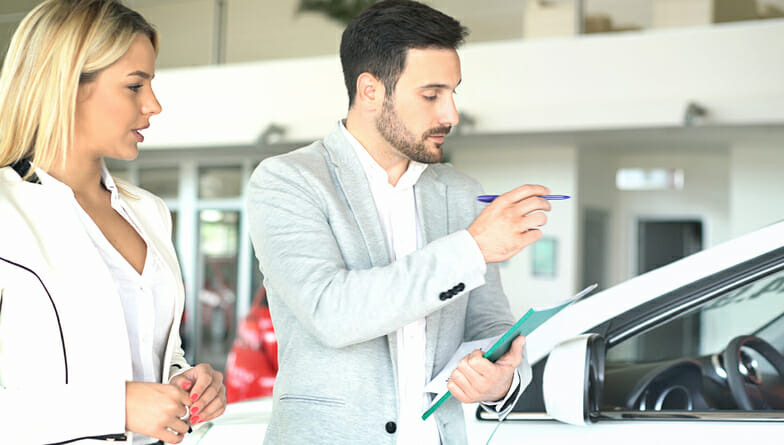Sales tax on large purchases, like a car, is crucial to factor into the price. Depending on where you live and the price of your car, sales tax can cost you thousands of dollars. But did you know there are legal ways to get out of paying sales tax on a used car? Let’s go over how sales tax affects your purchase and how to avoid paying sales tax on a used car.
If you’re looking to buy a car, a financial advisor can help you create a financial plan to reach your savings goals.
How Much Is Sales Tax on a Used Car?
Sales tax on a used car functions much like it does for new vehicles, it’s a percentage of the purchase price charged by your state or local government when you buy the car. However, the rate you’ll pay can vary widely depending on where you live. Some states impose a statewide rate, while others allow counties or cities to tack on additional local taxes. Because of this, a used car bought for $20,000 could cost hundreds or even thousands more once sales tax is added.
The national average state sales tax rate on vehicle purchases hovers between 5% and 7%, but the range is broad. For example, California’s base rate is 7.25%, while states like Alabama and Colorado stay closer to 4%. Some states, including Alaska, Delaware, Montana, New Hampshire and Oregon, don’t charge any state sales tax at all, which can make buying a car there significantly cheaper, though residency rules often prevent out-of-state buyers from taking full advantage.
However, if you buy a car in Michigan or Idaho, they both have a flat state rate of 6%. $20,000 on a car there results in $1,200 sales tax.
How to Avoid Paying Sales Tax on a Used Car Legally
There are a few ways to avoid sales tax on cars. You may qualify for an exemption if it’s a farm vehicle or it’s used for a church. You also may be able to get a tax rebate for turning in your old car.
But there’s one way to legally avoid paying sales tax on a used car, without an exemption or rebate. That’s to buy it somewhere that doesn’t charge sales tax and have it registered there. Five states don’t charge sales tax on used cars:
- Alaska
- New Hampshire
- Oregon
- Montana (no car tax on used or new cars)
- Delaware (no car tax on used or new cars)
If you live in one of these states, you can easily avoid any legal gray areas by just buying the car.
Why Buying a Car in Another State Doesn’t Work
Many car buyers assume they can dodge sales tax by purchasing a used car in a state with no or lower tax rates. While that may sound appealing, it doesn’t work in practice. Even if you buy a car in a tax-free state like Oregon or Montana, your home state will almost always require you to pay sales tax when you register the vehicle. The registration process is how states ensure they collect their share of tax revenue, no matter where the sale took place.
When you bring a car home from another state, you’ll need to register it to get license plates and legally drive it. During registration, your state’s Department of Motor Vehicles (DMV) checks where you live and applies the appropriate state and local taxes based on your residence. In most cases, you’ll be asked to show a bill of sale, and the tax is calculated on that amount. If you’ve already paid tax in the state where you bought the car, your home state may give you credit for that, but you’ll still owe any difference if your local rate is higher.
States are well aware of attempts to skirt taxes through “address loopholes.” For instance, registering a car under the name of a friend or relative in a tax-free state is considered tax evasion and can lead to fines or even criminal charges. Some states conduct audits or require proof of residency, such as utility bills or lease agreements, before processing registration. These rules make it nearly impossible to avoid taxes legally by simply shopping across state lines.
The Montana LLC Loophole

Now that we’ve covered how to avoid sales tax on a used car legally, let’s talk about a gray area. Especially when buying an expensive car or RV, you can save a lot of money by avoiding sales tax. One way people have tried is to set up a limited-liability corporation (LLC) in the only state that doesn’t charge sales tax on vehicles to resident LLCs: Montana. The vehicle is then bought by and registered to the LLC.
While this sounds like a pain, think of the savings. It’s relatively simple and cheap to set up an LLC (generally, around $1,000). If you’re buying a $300,000 motorhome and you live in Los Angeles, with a 9.5% sales tax, that’s an extra $28,500.
However, states are aware of this tax loophole and may still seek their payment. If they find out you’re driving the vehicle primarily in a state it’s not registered in, you can get in legal trouble. In fact, the California Highway Patrol has a form for citizens to report vehicles they suspect are driven by people trying to avoid taxes.
The problem with this loophole is that what’s legal in one state isn’t necessarily legal in another. It’s legal to set up an LLC in Montana to buy a car in Montana, but what you do with that car in your state is up to your state. If you need legal advice, talk to a lawyer.
Other Ways to Save on a Used Car
Maybe avoiding sales tax on a used car is unlikely for you. You can still save some money in other ways. Here are three:
- Negotiate a better price: Used cars have much more flexible pricing than new cars. You can look for cars that have been listed for a long time that sellers are more likely to be flexible on.
- Avoid dealerships: If you’re looking to save some money, you might have better luck with a private seller. Dealerships can get you to spend more with add-ons, whereas private sellers may just be looking to get a decent price for their cars.
- Come with cash: Cash is going to give you more negotiating power because it’s immediate. No financing is involved. And because of avoiding a car loan, you won’t be paying interest.
Bottom Line

Trying to skip sales tax by buying a used car in another state might seem like a clever workaround, but it rarely pays off, and can easily backfire. Because vehicle registration is tied to where you live, your home state will almost always collect its share of tax once you bring the car back. Instead of chasing loopholes, focus on legitimate savings strategies like trade-in credits or state-specific exemptions.
Tax Planning Tips
- If you’re navigating the complexities of taxes, it helps to have a professional in your corner. Finding a financial advisor doesn’t have to be hard. SmartAsset’s free tool matches you with vetted financial advisors who serve your area, and you can have a free introductory call with your advisor matches to decide which one you feel is right for you. If you’re ready to find an advisor who can help you achieve your financial goals, get started now.
- Budgeting can be extremely useful to improve your finances and help you save for big purchases like a car. SmartAsset’s budget calculator can help you create a budget to reach your financial goals.
Photo credit: ©iStock.com/chanakon laorob, ©iStock.com/praetorianphoto, ©iStock.com/gilaxia
